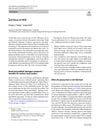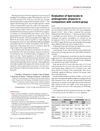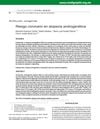 November 2023 in “The journal of investigative dermatology/Journal of investigative dermatology”
November 2023 in “The journal of investigative dermatology/Journal of investigative dermatology” Oral Janus kinase inhibitors may be an effective treatment option for lichen planopilaris with some risk of increased cholesterol and liver enzyme levels.
 May 2021 in “Histochemistry and Cell Biology”
May 2021 in “Histochemistry and Cell Biology” The May issue discussed publishing agreements and four studies on cholesterol in hair, cancer cell changes, hormones in the uterus, and skin protein effects.
June 2021 in “Egyptian Journal of Dermatology and Venereology” Psoriasis, acne, and hair loss are linked to unhealthy cholesterol levels, increasing heart disease risk.
223 citations,
January 2000 in “BioFactors” Food-derived peptides may help prevent diseases like high blood pressure and high cholesterol, and can support the immune system.
 45 citations,
February 2011 in “Journal of the European Academy of Dermatology and Venereology”
45 citations,
February 2011 in “Journal of the European Academy of Dermatology and Venereology” People with lichen planus have higher bad cholesterol and lower good cholesterol, increasing their risk for heart disease.
 37 citations,
January 2010 in “Acta dermato-venereologica”
37 citations,
January 2010 in “Acta dermato-venereologica” People with early onset baldness have higher bad cholesterol and lower good cholesterol, increasing their heart disease risk.
 27 citations,
January 2009 in “Journal of The European Academy of Dermatology and Venereology”
27 citations,
January 2009 in “Journal of The European Academy of Dermatology and Venereology” Men with a certain type of hair loss (AGA) have higher bad cholesterol and lower good cholesterol levels, making them more likely to get heart disease.
 20 citations,
June 2017 in “Hormone Molecular Biology and Clinical Investigation”
20 citations,
June 2017 in “Hormone Molecular Biology and Clinical Investigation” Long-term use of dutasteride for enlarged prostate may worsen blood sugar, cholesterol, and erectile dysfunction.
 17 citations,
January 2014 in “Journal of Clinical and Diagnostic Research”
17 citations,
January 2014 in “Journal of Clinical and Diagnostic Research” Patients with oral lichen planus or oral lichenoid reactions had worse cholesterol levels and a higher risk of obesity compared to healthy individuals.
 15 citations,
October 2016 in “Journal of The European Academy of Dermatology and Venereology”
15 citations,
October 2016 in “Journal of The European Academy of Dermatology and Venereology” People with hair loss have worse cholesterol levels, possibly linking hair loss to heart problems.
 8 citations,
April 1990 in “Hormone and Metabolic Research”
8 citations,
April 1990 in “Hormone and Metabolic Research” The medication combination did not affect glucose tolerance but increased some cholesterol levels due to its estrogen component.
 2 citations,
January 2005
2 citations,
January 2005 Men with a certain type of hair loss (vertex type AGA) may have higher levels of bad fats (triglycerides) and lower levels of good cholesterol (HDL), suggesting they could be at risk for high fat levels in the blood (hyperlipidemia).
 August 2024 in “Skin Research and Technology”
August 2024 in “Skin Research and Technology” Omega-6 and LDL cholesterol increase the risk of hair loss.
 December 2020 in “Research Square (Research Square)”
December 2020 in “Research Square (Research Square)” The Flo app showed that bloating, high cholesterol and glucose levels are common in women with Polycystic ovary syndrome (PCOS), and these symptoms increase with body mass index (BMI), suggesting a need to refine PCOS diagnosis criteria.
 September 2016 in “British Journal of Dermatology”
September 2016 in “British Journal of Dermatology” Doctors need more training in skin cancer screening, a new treatment is effective for a skin condition, better diagnosis methods for skin cancer are available, hair loss in women may be linked to hormones and cholesterol, certain skin care products might cause hair loss, babies' skin gets weaker after birth, and a gene mutation might be linked to eczema.
 January 2014 in “Revista del Centro Dermatológico Pascua”
January 2014 in “Revista del Centro Dermatológico Pascua” Male pattern baldness is not a risk factor for heart disease based on cholesterol levels alone.
 May 2012 in “15th International & 14th European Congress of Endocrinology”
May 2012 in “15th International & 14th European Congress of Endocrinology” Taking 1mg finasteride tablets for 6 months can lower good cholesterol (HDL) and raise triglycerides in men with hair loss.
January 2021 in “Menoufia Medical Journal” Women with pattern hair loss often have higher blood sugar, cholesterol, blood pressure, and waist size, suggesting a link between hair loss and metabolic syndrome.
 11 citations,
March 2021 in “Reproductive Biology and Endocrinology”
11 citations,
March 2021 in “Reproductive Biology and Endocrinology” Polycystic Ovary Syndrome (PCOS) symptoms vary globally, with bloating, high cholesterol, and glucose levels being common; the current diagnostic criteria may need refining.
 August 2017 in “International Journal of Research in Dermatology”
August 2017 in “International Journal of Research in Dermatology” Lichen planus is not linked to metabolic syndrome, but it is associated with higher rates of high blood pressure, high triglycerides, and low HDL cholesterol.
 March 2017 in “Iraqi Journal of Pharmaceutical Sciences”
March 2017 in “Iraqi Journal of Pharmaceutical Sciences” Abuse of anabolic steroids in Iraqi athletes leads to negative effects on hormones, liver and kidney function, blood sugar, and cholesterol levels.
 March 2020 in “Journal of evolution of medical and dental sciences”
March 2020 in “Journal of evolution of medical and dental sciences” Male pattern baldness, especially the vertex type, could be an early sign of cardiovascular risk factors like high cholesterol and diabetes.
 28 citations,
February 2011 in “Clinical Endocrinology”
28 citations,
February 2011 in “Clinical Endocrinology” Women with PCOS have unhealthy changes in their cholesterol particles that are not related to their body weight.
 2 citations,
February 2023 in “BMC endocrine disorders”
2 citations,
February 2023 in “BMC endocrine disorders” Curcumin improved some metabolic factors in women with PCOS but did not affect cholesterol, insulin, or testosterone levels.
 9 citations,
January 2021 in “Advances in Experimental Medicine and Biology”
9 citations,
January 2021 in “Advances in Experimental Medicine and Biology” Astaxanthin may improve health by reducing inflammation, stress, and cholesterol, and by enhancing skin health and sports performance.
 5 citations,
December 2016 in “Journal of skin and stem cell”
5 citations,
December 2016 in “Journal of skin and stem cell” People with cutaneous Lichen Planus are more likely to have Metabolic Syndrome and related conditions like high cholesterol, diabetes, and high blood pressure.
4 citations,
January 2018 in “JBRA assisted reproduction” Orlistat helped reduce weight and testosterone in obese women with PCOS but did not significantly affect other androgens or cholesterol levels.
 December 2023 in “Benha Journal of Applied Sciences”
December 2023 in “Benha Journal of Applied Sciences” Men with male pattern baldness have higher blood sugar, bad cholesterol, and ZAG protein levels than healthy men.

Eating flaxseed made rabbit hair longer and thicker and improved their weight and blood sugar and cholesterol levels.
 53 citations,
December 2015 in “JAMA Dermatology”
53 citations,
December 2015 in “JAMA Dermatology” Women with PCOS often have more body hair, acne, and skin darkening, and these signs are linked to metabolic issues like insulin resistance and high cholesterol.

























